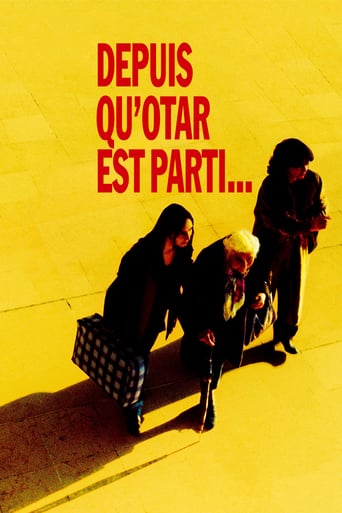paul2001sw-1
With explicit themes such as poverty, exile, old age and death, 'Since Otar Left' does not exactly make a pitch as light entertainment; and a subtle screenplay that wrings every last note of poignancy from its basic scenario could be seen to aggravate matters even further. But as well as its script, this film has other merits, including fine cinematography and excellent performances from its small cast. Perhaps what's best of all is the way that it combines universal themes with the particulars of its situation, in the former Soviet republic of Georgia. The characters' own story reflects (and is indeed part of) the story of the country as a whole; and that is the story of the death, and eventual rebirth, of hope itself. This is a film that isn't always easy viewing, but it's also worth sticking with.
George Parker
"Since Otar Left" is about three generations of Georgian women (an old women, her daughter, and her granddaughter) who live in austerity in an old flat in Georgia. The grandmother looks forward to letters she receives from her only other offspring, a son Otar, who is working in Paris. When Otar dies unexpectedly, the two younger women intercept the bad news and hatch a plan to keep the letters and the happiness they bring coming to the old woman. As the film develops this meager plot and we watch the women trudge through their mundane daily activities we are unaware of a more significant plot developing before our eyes with both plots culminating suddenly at the film's end.Those who prefer a steady diet of the usual commercial Hollywood film products will likely find "Since Otar Left" a monotonous film of little consequence. However, those who enjoy the people stories of French cinema with their natural and finely nuanced studies of human nature, this sensitive, plaintive, and charming gem is a fly-on-the-wall look at a slice-of-Georgian-life which should not be missed. (A-)
noralee
"Since Otar Left (Depuis qu'Otar est parti...)" deals heartbreakingly humanistically with many of the same political and family issues that "Goodbye, Lenin!" treats for humor -- today's ironic adjustment to capitalism in former U.S.S.R. satellites, the cross-generational responsibilities of those who lived under the Big Lies, and filial love.
With dialogue in French, Georgian, and Russian, debut writer/directer Julie Bertucelli focuses on a Francophile household of an earthy grandmother, mother, and daughter in Georgia and their relationships to the dead, absent, and present men who are satellites in their lives. While there's reminders of O. Henry's "The Gift of the Magi" and "The Last Leaf," not a single character is a cliche or dumb and none of their decisions is predictable. The audience literally holds its breath to see each woman's reactions as their emotional predicaments get more complicated in a weave of their own making. The actresses, from 21 to 90 years old, brilliantly convey the complex emotional see saw. A simply beautiful movie that's one of the best of the year.
tommyg
If this is, indeed, Julie Bertucelli's first movie as Director, then I am truly impressed. From the very first scenes, I was ruptured by the resourcefulness and simplicity in the powerful storytelling and movement of the film. In fact, the film was a study in cinematography in which the film itself is almost an art form. The combination of simple scenes with audio transition overlays gave the viewer a broader sense of things happening -- even if by suggestion and without undue visual distraction.I found myself admiring the camera's creative photography (i.e. Director's eye) along with a layer of audio collages which surround the actors in their own roles and environment. I was as if I were taking in three art forms at once.This film would surely work well as a "study" by any budding film school enthusiastic -- particularly if the budget is lean and cast is skillful.

